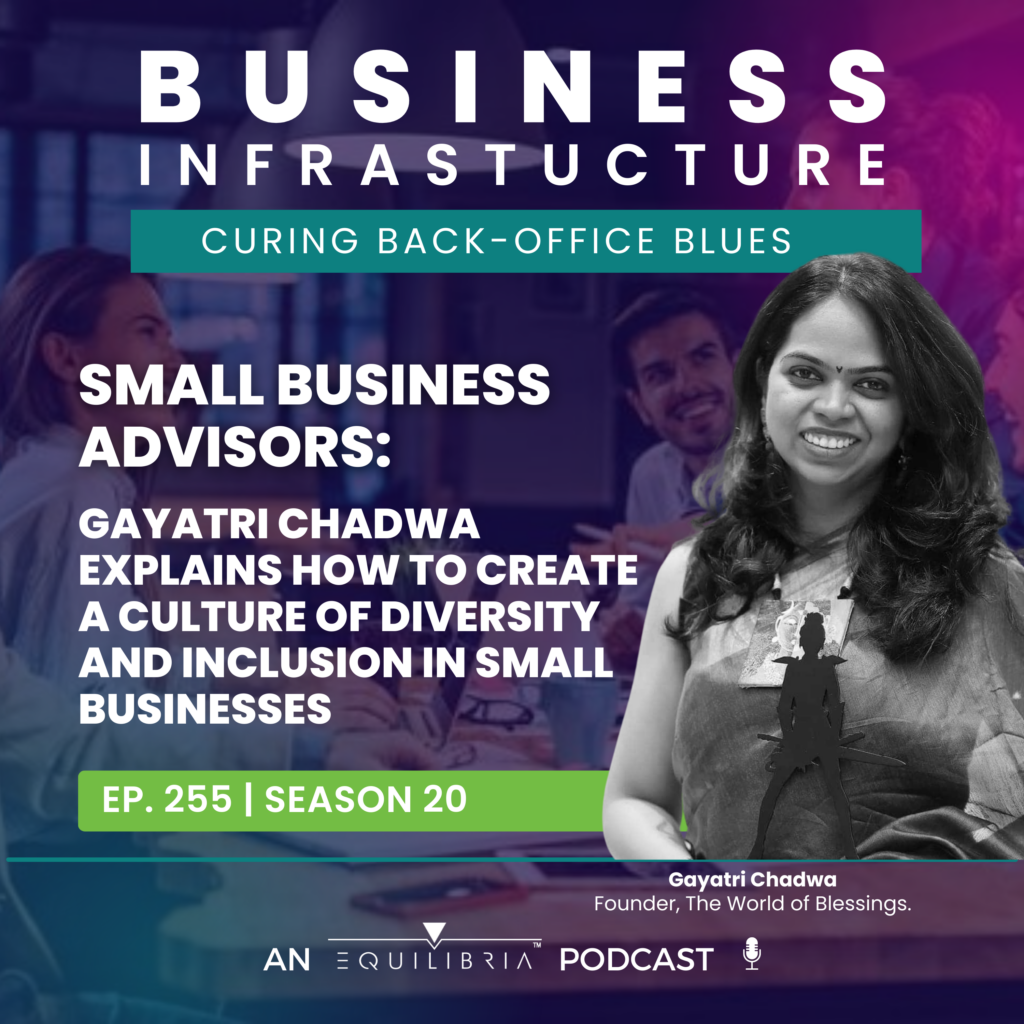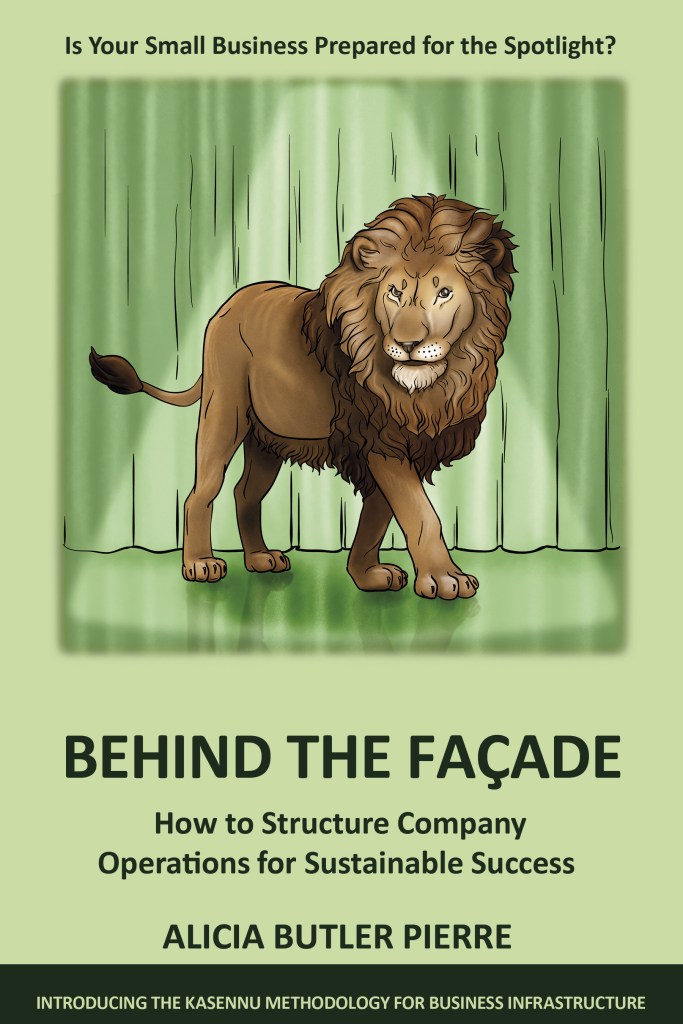Transcript
Diversity, Equity, Inclusion, Belonging…these are all terms we’ve heard ad nauseum but what do they really mean? Why does it matter? And does your small business’ culture need it? Well, the answer to that question is yes! And as for why it matters and what it all really means, well, that’s what today’s episode is all about. No fluff, no frills, no woo, just some good ‘ol practical advice that yields sustainable business growth.
This episode is underwritten by Equilibria, Inc. the company behind this podcast where we design scale-ready business infrastructure for fast-growing small businesses.

We’re in Season 20 of the Business Infrastructure podcast – the show where we share operational tips, strategies, and tactics to help you cure any back-office blues you might be experiencing. I’m Alicia Butler Pierre and this season features 12 small business advisors, each with a unique skillset they’ll share with you.
Our next featured advisor is an expert in education, diversity, and inclusion training and operations. In fact, she’s the latest addition to our team here at Equilibria. We’ve already benefited from her vast knowledge of team dynamics and implementing tools to ensure everyone’s voice is heard, acknowledged, and appreciated. And now you get to experience a little of that too. And before you start thinking, what does diversity and inclusion have to do with my small business, I guarantee you this area isn’t unique to America, and it certainly isn’t just for the big companies to implement.
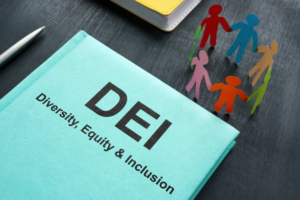
This is Episode 255 – Gayatri Chadwa Explains How to Create a Culture of Diversity and Inclusion in Small Businesses.
I’m Gayatri Chadwa. I am based in Pune, India, and currently, I am the founder of Sva Eternal. At the same time, I’m co-founder of an initiative called The World of Blessings. And just today I am also a partner of a company called In & Disco Sanity. So, these are the three things that I do. Apart from that, I do take on a lot of projects for inclusion, diversity, and operations with different organizations.
Thank you so much, Alicia. Firstly, for inviting me. It’s an honor to be here interacting with you because you have been doing such amazing work and talking to so many people that I’m truly humbled to be one of them.
You can probably tell that Gayatri is a woman of many talents. With such a rich and broad background, the common thread that weaves together her multiple specialties and businesses is…teaching. In fact, that’s where we’ll begin – when Gayatri was a student at University studying teaching.

Teaching, I think comes from blood for me. I have a huge line of women who have been teachers in my family. So that part was always there where teaching is very passionate about. And I started teaching fellow students, fellow colleagues as we progressed further. Then I came into education full-time. I started off in a corporate job, but somehow my mind didn’t stay there because I was more inclined to help the upcoming generation.
So, I got into teaching. And as years went by, I saw a gradual shift, where students required that extra help. The students were struggling with gender identity. The students were struggling with mental health struggles. The students were unsure of what to do about themselves because there was so much pressure, building up every single day to do the best they could.
There was a lot of pressure and expectations, not just from the parents and teachers, but also the peer pressure to do something and be something. The fads that we talk about, this has to be done. I have to fit in. That need to fit in started growing so much that people started disconnecting from themselves. And I think that is where my inclination towards mental health and gradually towards diversity and inclusion came in because I saw so many of the youth struggling, trying to fit in where actually they just needed to be themselves. For each one of us, the only thing that we require is to be accepted.
These troubling patterns that Gayatri noticed with her students sadly trickled over into her personal life.
And I think that is where my keen interest in this topic and this field came into being because, unfortunately, I lost someone because of the trauma, the harassment that they went through. And I think that was the aha moment that, you know, no, it’s not just about being on the outlines. You can actually be a part of it and change the system yourself. And that is how I gradually shifted focus. I am still into education, that comes with passion. But now I focus more on trying to create awareness and trying to train people on diversity and inclusion and creating those safe spaces for people.
And creating those safe spaces for people has led Gayatri to also work with companies as well. As she worked with students in helping them develop life skills to navigate future workplace challenges, she realized she was also in a key position to bridge a diversity and inclusion awareness gap between her students and their future employers.
There are different ways in which I try to create, either I do the training for creating the spaces, or I go in as a conversation starter. So, a lot of places it’s just a conversation that is required to get it going. And I go in, and do a small workshop of sorts where we start the conversations on topics that are usually not discussed. And once you create that space, okay, this is my organization can talk about it freely, I think that is just a push required for it to happen.

Because inclusion is not just about gender inclusion, it’s about every individual to feel belong, be it an individual with disabilities, be it an individual with special needs, be it somebody who’s an outsider to the culture as a whole. I think when we talk about diversity and inclusion, it covers everything. And that is where my focus lies. It’s not just about gender, but it’s about every individual in society, for them to feel belonged.
I want to take a slight detour for a moment and explain something that personally surprised me. Gayatri and I first met during a Women’s Economic Forum event in Delhi, India. We were both speakers. During that conference, I was honestly very shocked to see the number of speakers talking about diversity, equity, and inclusion. In my own ignorance, I didn’t think it was a topic that was on the radar in a country like India, particularly LGBTQ+. But, as Gayatri explained, diversity, equity, and inclusion can take on many forms.
Every individual is different. I mean, that is the basis of diversity. As individuals, we are very different. But when you specifically talk about the context of workspaces, of the work culture, and of individuals from the LGBTQ community today, I can say yes, there is a little more acceptance towards these topics. There’s a little more sensitivity towards this topic.
But even today, if you’re walking by on a roadside, and if you see somebody from this community, people still go back a little. There is that glint of separation that we still see in the eyes of the people. And it’s not just about that, but there are so many transgenders who are homeless. There are so many people out there who are not to the best of their capabilities because of the bias that they have faced, not just from society, but unfortunately in many cases from their own families.
There is a lack of a support system, both to cope and to understand what is happening to them. And it’s not just when they come into this particular field where they have to start working, but a teenager who is unsure of what they are feeling and why they are feeling it. Recently I had conversations with some people and we saw that the younger generation that is growing up now, the teenagers, are more open to these concepts.
I don’t know about you, but as I listen to Gayatri, I can’t help but wonder….how does she define diversity?
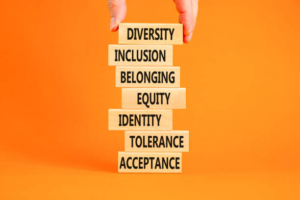
Diversity for me is humanity. Because as humanity, I think diversity comes completely into it. But corporate India still needs to be more accepting. I think there’s a lot more that needs to go into creating that awareness that we are all in the end, just human. There is no bias as such. It’s just that everybody’s looking out for that space of acceptance.
I love that quote! Diversity is humanity. It concisely summarizes what diversity means. Now, from an inclusion perspective, how do you define inclusion?
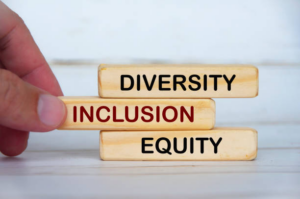
Inclusion is not just saying that you are a part of the whole, it’s actually respecting, accepting, and actually walking the talk. Alot is being spoken about it. Everywhere you go, you find inclusion, you find diversity. You find it everywhere. Everybody’s talking about sustainable development. Everybody’s talking about inclusion.
But when someone walks into the room and when they do not feel that space of belonging, I think inclusion is missing. So, for me, I think inclusion is complete when every individual in the room feels that they belong there, where they are a part of the whole, and their opinions, their feelings, and their emotions, all are taken into consideration. And, it might not be totally like, you know, I am holding an office in the corporate world, but my voice and my ideas are heard and considered that feeling is
also equally important. That there is still hope for me to grow.
Now that Gayatri has defined diversity and inclusion, you may be wondering first, how does this apply to my smaller company, and second, how would you even begin to create a company culture that is in fact, inclusive? Do you have to be intentional about building a diverse team?
I would say don’t. It’s not possible to be intentional all the time. I would say be open to accepting the person who really fits your requirement, irrespective of who they are or where they are from, or which community they belong to. Be open to taking the best candidate who’s fitting your job description, and your requirements. And secondly, once you have somebody on the team, do not ever make them feel as if they are not heard. And coming to your earlier question of why does a small business require this?
Because it’s not just within the organization, but if you want to become something bigger rather than a small business, as you grow, you definitely would need it. It’s not just within the organization, but your clients might be somebody for whom it is important. And if they don’t see that culture, and if you just go and say, “Oh no, we are very accepting of diversity and inclusion,” but when they see your work ethics and they see your policies, which are only on paper, then you might have the risk of losing business also.
Because today, fortunately, every individual is becoming more aware of these terms, and these instances. And, again, it could be that as you grow, somebody from your own team might require that place where they feel belong. And I feel the strongest businesses come when every person owns the business as their own. Because then you don’t have the risk of losing your data, of losing the people that you’ve built, or of people not really working for you instead of creating. And I think creating inclusive spaces is as simple as creating a space where they are not working for you, but they are working with you.

Hmm…so everything Gayatri just explained about building a diverse team and a supportive culture where everyone feels a sense of belonging requires business infrastructure. If you’re serious about not just growing your business but actually scaling it, as she just said it requires having the right people, processes, and tools. Just like scaling requires you as the business owner to work on your business and not in your business, it also requires your team to work with you and not just for you. Coming up after the break Gayatri will explain exactly how to create this dynamic at your company.
How do you know if your business is growing faster than you can keep up with? If you have trouble keeping up with things like deliveries and projects. Your customers are angry, team turnover is high, and the complaints are piling up. Where can you go for relief? How can you save your business from the chaos of unmanageable, fast growth?
It might be time to build business infrastructure. Business infrastructure is a system for linking the people, processes, tools, and technologies that act as the heartbeat of your back-office operations. It gives your fast-growing small business a stable foundation to not only continue growing but to scale in a profitable, sustainable, and repeatable way.
That’s why if you want a business that can consistently operate without your daily presence, then the Smooth Operator course is for you. It’s an online introductory course on business infrastructure that can provide you with proven tools, tactics, and techniques to calm the chaos and restore order. Go to SmoothOperator.courses to learn more. That’s SmoothOperator.courses.
Before the break, Gayatri Chadwa, a lifelong educator, entrepreneur, and diversity and inclusion advocate, mentioned that one proven way to ensure a culture of belonging is to give your team ownership. But what exactly does she mean by that? Does it mean offering your team equity in your business? Or is it about giving them autonomy to do their work with minimal interference? Here’s Gayatri.
Yes. Because giving out actual ownership is not the practical way of it. It is because, in the end, it’s your baby that you’ve created. But giving that autonomy, giving that responsibility where the person feels, Oh, I am being trusted with the work that I do. I am respected for my opinions and my ideas, and I am given the freedom to express my ideas and for those ideas to be considered. I think that is the ownership.
If somebody gives me that particular thing, I don’t think I’ll leave that organization for anyone else, even if it means a little more money. Because in the end, I think today, especially after the pandemic, we have realized the importance of mental wealth. I won’t say health, the mental wealth that we have.

Because that is more important than anything else. And I think the pandemic has taught that to us brilliantly. And if that is at the forefront, I don’t think a person would like to go to a different part and start over. If their ideas are encouraged, if success is celebrated, and if they are a part of the team.
I’m very passionate about small businesses because whoever joins the small businesses from the beginning, would like to see it grow. You grow as a family, you grow as an organization where people know every small thing about everything. There are times when the roles are blurred so much that everybody’s doing everything, but that is the beauty of small businesses. And I think that is something that will definitely push the business to higher lengths and greater heights. And I think the sky is the limit in that particular manner.
And if the sky is the only limit to how far you can take your business, then imagine what else you can accomplish with the right business infrastructure in place. So far Gayatri’s covered the people and process elements of imbuing diversity and inclusion into your company’s culture. But what about the tools element? What are some practical things that we small business owners can do to facilitate diversity and inclusion?
So, for diversity and inclusion specifically celebrating somebody’s success could be a difficult task. But I was at an office, a very small office as such, and that is where I saw this technique that they had. And I love that so much that I tell a lot of other organizations that I talk to. So they had this beautiful bowl, which was kept at the reception where they used to write things, okay, something good about you. And, anonymous. So, let’s say you are beautiful. You are, you know, the life of the party. And everybody used to come and put it there, and it was just kept at the reception where everybody checks in in the morning, and they used to just pick it up.

Or even when they used to feel stressed out or something, they used to just go and pick up a chip from the bowl, read it. And I think they used to feel good about themselves. They used to feel motivated enough to do the next thing. So, I think some things, small hacks, you don’t have to go extra wagon outside or buy big things or celebrate some things. It could be as simple as if
somebody has done something for you or for your organization, just an appreciation email, “Oh, you know what? You did a great job!” Or just announcing or giving the due credits where they’re needed. I think that are the small, small things that we really need to implement.
And in case you’re thinking that this is too much work for your small business and that diversity and inclusive work cultures are only something that big companies need to worry about, then think again! Check out what Gayatri has to say about that.
When small businesses say these are for big enterprises, but small businesses are started with a vision to go into big enterprises. So I would say that if you start at the inception, then it won’t be so difficult because that will be a part of your business culture. As you grow a part of your business infrastructure, I would like to say, that these are small things, which take you a long way. Having that corner for your employee to go and just relax for some time.
Having that support system in place, having something, like, you know, a weekly meet just to unwind in the office or having that one hour, possibly a Friday afternoon when nobody is in the mood to work because it’s the weekend, the next day. You could actually help your employees to unwind and share things to create that trust factor within the employees. Because we all would agree that in the office environment, in the business environment, everybody has that one go-to person.

Where all the gossip also goes, all the good, all the bad things also go. Why not create the entire office space, a big platform where everybody can openly share, where they can just put forth without the fear of what the other person says? I’m not saying to be the taskmaster where judgments are totally banned. It’s human to judge. I mean, you look at somebody and you have a judgment, Oh, look at the earring. Well, look at the dressing sense. You have those judgments. It’s what you do about them that is important.
Hmm…”It’s what you do about them that is important.” Sounds like Gayatri is talking about thinking before you act and speak. If creating a culture of diversity and inclusion at your small business still seems like a daunting task to you, then you may find it helpful to read some of the books Gayatri recommends.
For me personally, there are a couple of books. These are not related to business infrastructure, but these are the books that I personally go to whenever I feel a little low, I feel the confidence lacking. So there is this very beautiful book called The Midnight Library, which I go back to, because, it gives you a perspective about no matter what the possibilities, it’s your decision of what to do in that situation that gets you out of it.
Apart from that, being a life coach or somebody who works a lot with, you know, therapies and all, there is one book, Many Lives, Many Masters, which gave me a very different perspective on life as such. So these are a couple of books that I read myself regularly, but if anybody is interested to read, especially about business infrastructure, I recently read Alicia’s book, and I must say that if you really want your business to grow, please refer to that book. Just go to the Equilibria website and you’ll find the book there. Please get a copy for yourself. I think your business will be sorted.

Quick disclaimer – I did not ask Gayatri to plug my book. She did so coming from a very sincere place. Now at this point, you may also be wondering how to create and encourage a diverse and inclusive workplace when you have a fully or mostly remote team as we do here at Equilibria. As Gayatri explains, it’s totally possible.
Same thing. An online party where everybody has their own set of food and drinks and whatever they want. Have good conversations. Have those meetings, which give you that personal touch. Something apart from your weekly meetings that you have for your business, but have that personal touch, have that personal, anchor arrangement.
It could just be simply on birthdays of your employees, sending them something to their place where they are not expecting it, but the bell rings and there’s something from the office, even though they are working remotely, that gives them, oh, I am cared for. Yes. And when you feel that you’re cared for, I think that is the best thing you can give to your employees, the feeling that they are appreciated, that they are remembered, and that they are cared for.
And that’s what it’s all about in the end. Taking care of your people. Those who are on the front lines as well as in the trenches of your back-office operations. If you want some one-on-one advice from Gayatri on specific things you can do at your business to help your team feel a sense of belonging, then reach out to Gayatri. Here’s how…
LinkedIn is the best way to reach out to me. I accept all connection requests. You can just send me a message on LinkedIn and then we can take it forward from there. I do work with companies outside of India. I work in almost every time zone possible. So, I’m a person who can work with very less sleep.
And I can personally attest to that because sometimes whenever Gayatri and I get together and we meet, I’m like, “Are you sure it’s okay? Because this would be 10 o’clock at night for you,” and she’s like, “Nope, it’s fine! It’s okay.” So, I don’t know how you do it, but I’m glad you do whatever you do and you are indeed a blessing. You’ve already done so much to help us here at Equilibria and I’m so excited to see what we are able to build together. Gayatri, my friend, thank you so much for joining us today. I really appreciate it.
Thank you so much, Alicia, for having me. It’s been an honor.
Don’t forget to check out those books that Gayatri recommended and be sure to connect with her on LinkedIn. We’ll have links to those books and Gayatri’s contact information in the show notes at BusinessInfrastructure.TV. Again, that’s BusinessInfrastructure.TV.

Thank you so much for listening! If you enjoyed this episode, then subscribe to the show and leave a five-star rating, and review wherever you’re listening.
As you continue navigating the operational challenges of managing a fast-growing small business, just remember to stay focused and be encouraged. This entrepreneurial journey is a marathon and not a sprint. Don’t grow alone! We’re here to support you so don’t hesitate to reach out to us.
This podcast was written, produced, and narrated by me, Alicia Butler Pierre. Audio editing by Olanrewaju Adeyemo. The original score and sound design by Sabor! Music Enterprises.
This is the Business Infrastructure – Curing Back-Office Blues podcast.


